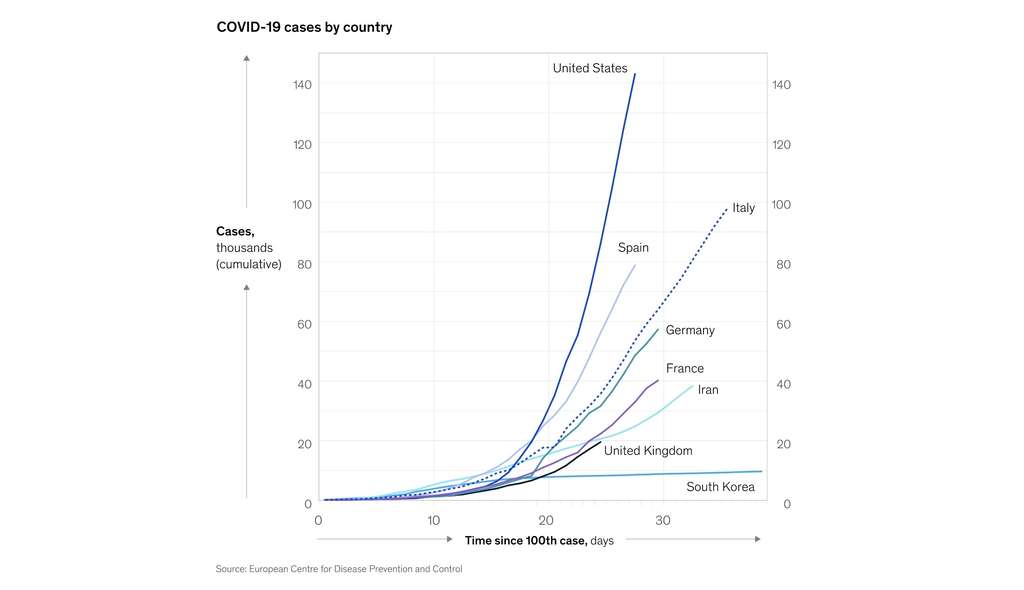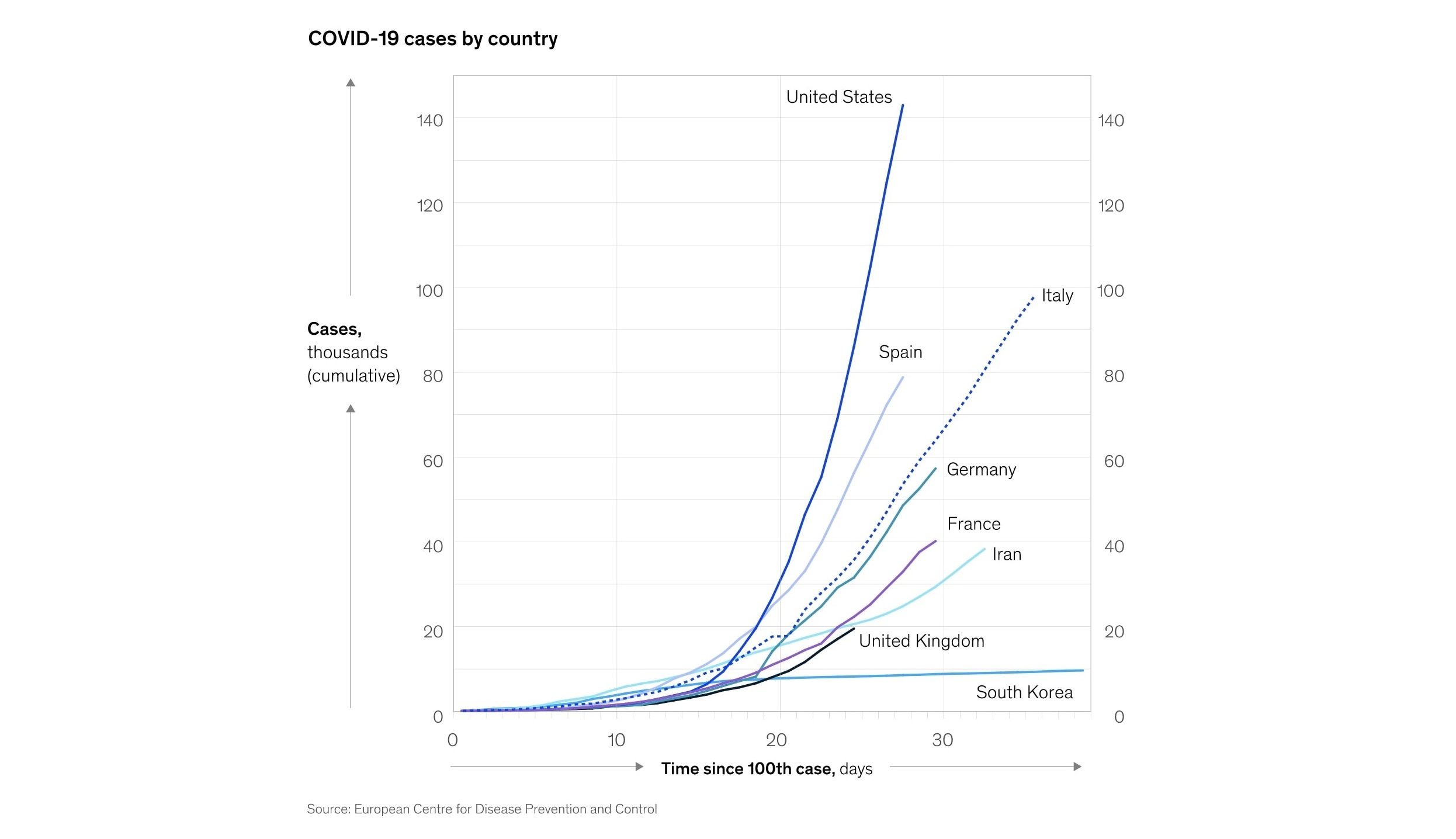What Is the Impact of COVID-19 on Entrepreneurship?
In the face of the worldwide COVID-19 pandemic, Entrepreneurs have to face a new reality: that it is not only a huge sanitary and health crisis affecting million or even billion people in all over the world. This is also an unprecedented downturn on the global economy. For instance, France has lost 6 GDP points in 15 days and 10 million people in USA has been laid off. This reveals the breakability of our economies and its fundamentals.
If the world has quickly shifted under our eyes, the different scenario and reality are not the same depending on where you are running your business today.
The government, public health and economic responses are tremendously different if you are an entrepreneur based in USA or in Europe. As founders, you also don't have the same action plan to put in place depending on your sector and industry. If you are in online shopping, food delivery, video gaming or video conferencing industries where businesses are currently booming, is not the same as if you are running a business in the hotel, restaurant, retail, entertainment, or sport industries. These industries could take the opportunity to innovate with more digitalization and disruption implemented in their business models in order to increase the touchpoints with their customers.
Those Entrepreneurs should be ready to lose 50 to 80 per cent of their turnover as well as their valorization. The Lime start-up (the urban mobility e-scooter star company), for instance, lost 80 per cent of valorization in one month. Last year, its last fundraising ($310M USD) established its valorization at 2,4Billion USD and now after the company laid off 110 people out of 600. According to theinformation.com, Lime start up is short on cash and must raise money. Today its new valorization dropped at $400M USD. Ditto for Airbnb, the accommodation star company, Airbnb planned to enter the stock market in 2020 but the IPO will be postponed to next year. According to Financial Times, the company lost 16% of its valorization which decreased from 30 billion USD (2019) to 25 USD billion last week.
Nevertheless, there are two good news:
- Entrepreneurs are fighters, optimistic and resilient. They will overcome this difficult period because this is in their DNA to bounce back.
- Every crisis is not limitless, and the end entrepreneurs can always undertake something.
A basic reminder: a company needs 3 assets to be profitable and sustainable:
- Money (access to capital)
- A know-how or a specific expertise
- A team (people)
Your 1st asset: Money
Keep playing to win, not to survive: Manage to survive and at the same time, you'll prepare for the day after the crisis exit.
Action 1: The Diagnostic
Accept your previous business plan is now irrelevant, outdated then prepare and plan for a worst-case scenario. You need to face the reality:
Ask yourself: Where were you at the beginning of 2020 (in January)? Were you in good shape or not and why? Where will you see yourself in Q3 or Q4 2020? How much money do you have in Cash today? How much money do you need to stay alive during the coming 18 months? Prepare your plan for Q1, 2021.
Action 2: Cash (expenses and revenue sources)
Cash is key. Then it's time to review all your expenses, non-essential expenses must be cut in order to reduce your cash burn rate. You have to make your company leaner by transforming your fixed costs into variable costs in order to become more agile. Reduce marketing and events costs, everything which is not essential to the daily life of the company should be cut off.
Pinpoint and look after your revenue sources. Analyze your customer portfolio try to guess who amongst your customers might be not able to pay anymore their invoices. Encourage faster payments from your clients.
Action 3: Access to capital
Evaluate and calculate the potential risks. At the same time, validate with your VCs, your shareholders, your partners, your banker, your trust relationships if they are ready to support you and to help you during this crisis period and until where and when. Secure your funding which you evaluated to stay alive during the next 18 months. Bear in mind, fundraising on video conferencing doesn't work, at least until today. Trust and confidence behind a screen are not obvious to establish.
Do not: wait for the end of the crisis without taking immediate actions considering this sanitary crisis is not under your control and responsibility.
Do: position your company for growth, downturn is the best opportunity to improve your fundamentals, see below.
Your 2nd asset: Your expertise, your value proposition, your market - fit product
Take this opportunity to improve your fundamentals and to make them more robust.
Your product:
The tech and developer team could use this time to go deeper and to improve your product. Make sure you are creating a pain killer. Take this time to train your tech team to new technology software (online and free open platform).
The executive team: Take this opportunity to improve your market fit, what is your real value proposition. A strategic thinking is possible since for once CEO and executives are not undergo to the short-term figures and the dictature of monthly & quarterly turn overs and outcomes. Try to step back change or adapt your strategy and put in place new processes.
The sales and marketing teams:
Take this time to talk and innovate with your best customers, analyzes your NPS (net promoter scores), understand why they love your product and why they could leave you. Dive deeply in your customer database. Find out your advocates and what features are missing: do you have time to implement them and to make your product, offer 10x times better?
It's also time to innovate with new collaborations, restaurants can move to take away food, some restaurant provide every morning some recipe on their social media page or account and client could order food or dishes and send them to their customers through collaboration with UberEATS or other delivery food apps, they never imagined one month before
Your 3rd asset is People : Reimagine your new future and way of working
During this crisis time your employees must remain more than ever committed in order to go through it. Communication is crucial. Increase your daily communication and try to reduce as much as possible the uncertainty in order to keep your employees relieved. Take care about them, protect them, be sure they are heathy and safe. Be crystal clear and honest with your teams on what you know, what you don't know. Bear in mind, remote working offers more flexibility, but it will kill serendipity time, spontaneous time (decision taken at the coffee machine). Trust and humility are critical to reinvent or innovate your managerial practices. Be closer to your teams. Managerial innovation could be less control and more trust. You should reinvent and change your way of working with their inputs. This troubling time requires different cultural shifts. Don't hesitate to ask them how they would like to work when the normal routine will be there.
Do not forget that during crisis the most disruptive or interesting companies have been created and took off such as Google, eBay, LKDN …after 2001 and Uber, Airbnb, Instagram, WhatsApp, after 2008 crisis, this means there are great opportunities for great leaders!
After the COVID-19 crisis the lessons learnt are:
- The travel limitation of goods and business travelers (more remote working and remote meetings) due to the impact of the physical distancing. There will be other sanitary crisis or new wars due to the global overcrowding.
- The potential growth dematerialization of products and services: we could witness of the booming of 3D printers to produce masks and ventilators in each country.
-
Agility
is when we see Apple changing their operations to design, produce and ship face shields for medical workers.
The low-cost model where China and India, are the worldwide manufactures will be ended. Globalization as well. This crisis will change the relationships between countries and states, new challenges, new stakes, new dangers, news threats (health and climate). Governments must and will demand to be independent and autonomous with critical medical supplies and medicines but not only they would like to reduce future vulnerabilities. We can learn how Korea, Singapore, and Taiwan have rapidly contained COVID-19, but these people are ready to accept person tracking and facial recognition which are not yet acceptable in democracy (i.e. Europe for instance). A world less open and probably, less free is to be expected.
With Containment in the main parts of the Globe, we'll see for sure new ways of life producing new needs, then new opportunities for entrepreneurs. Some new business models, new offers about dematerialization have to be invented. In the coming years, the new king of the world will be the "Amazon of dematerialization" and Entrepreneurs will be those ones who will implement this new world.

